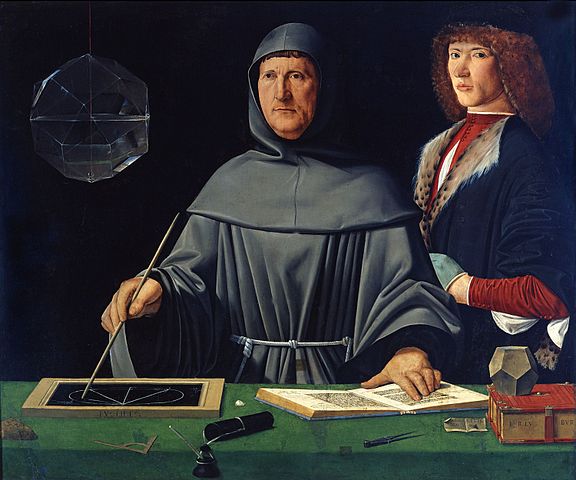
File:Pacioli.jpg

| |
This is a file from the Wikimedia Commons. Information from its description page there is shown below.
Commons is a freely licensed media file repository. You can help. |
Summary
| Artist |
|
||||||||||||||||||||||
| Title |
Italiano: Il Ritratto di fra' Luca Pacioli con un allievo (Guidobaldo da Montefeltro?) attribuito a Jacopo de' Barbari, è un quadro (olio su tavola, cm 98 x 108) che si trova a Napoli nel Museo di Capodimonte. L'opera, pur essendo esposta nella Galleria Farnese, non fa parte della Collezione Farnese, trattandosi di un acquisto dello Stato italiano fatto nel 1903-1904.
English: Ritratto di Frà Luca Pacioli (1495). Luca Pacioli (1445–1517) is the central figure in this painting exhibited in the Museo e Gallerie di Capodimonte in Napoli (Italy). The painter is unknown, although some people are convinced the painter is Jacopo de' Barbari (1440–1515). It shows Pacioli standing behind a table and wearing the habit of a member of the Franciscan order. He draws a construction on a board, the edge of which bears the name Euclides. His left hand rests upon a page of an open book. This book may be his Summa de Arithmetica, Geometria, Proportioni et Proportionalità or a copy of Euclid. Upon the table rest the instruments of a mathematician: a sponge, a protractor, a pen, a case, a piece of chalk, and compasses. In the right corner of the table there is a dodecahedron resting upon a book bearing Pacioli's initials. An rhombicuboctahedron (a convex solid consisting of 18 squares and 8 triangles) suspends at the left of the painting. The identity of the young man at the right is uncertain, but one commentator recognizes the “eternal student" instructed by Pacioli. Some authors have also mentioned the possibility that the student is Durer.
|
||||||||||||||||||||||
| Date | 1495 | ||||||||||||||||||||||
| Medium | painting | ||||||||||||||||||||||
| Source/Photographer | Lauwers, Luc & Willekens, Marleen: Five Hundred Years of Bookkeeping: A Portrait of Luca Pacioli (Tijdschrift voor Economie en Management), Katholieke Universiteit Leuven, 1994, vol. XXXIX issue 3 p. 289–304) | ||||||||||||||||||||||
Licensing
| Public domainPublic domainfalsefalse |
 |
This image (or other media file) is in the public domain because its copyright has expired. This applies to Australia, the European Union and those countries with a copyright term of life of the author plus 70 years.
|
|
|
|
| Annotations | This image is annotated: View the annotations at Commons |
Scientist fra Luca Pacioli
EVCLIDES
Illustration to Euclid's theorem
Dodecahedron from wood
Rhombicuboctahedron
"Euclid's Elements", book XIII
Cartellino with inscription: "JACO. BAR. Vigennis. P. 1495" that possibly means painter's name and age: "Jacopo de'Barbari 20 years old. Painted in 1495"
inscription "Li. R. Luc. Bur." that possibly means: "Liber Reverendi Lucas Burgensis" (Venerable Lucas from Borgo's book) and than it should be his work "Summa de arithmetica, geometria, proportioni et proportionalita" printed in Venice, 1494
Unknown pupil
File usage
Metadata
| Width | 3,065 px |
|---|---|
| Height | 2,554 px |
| Bits per component |
|
| Compression scheme | Uncompressed |
| Pixel composition | RGB |
| Orientation | Normal |
| Number of components | 3 |
| Horizontal resolution | 300 dpi |
| Vertical resolution | 300 dpi |
| Data arrangement | chunky format |
| Software used | Adobe Photoshop CS3 Macintosh |
| File change date and time | 09:42, 6 March 2012 |
| Colour space | Uncalibrated |
| IIM version | 2 |
About Schools Wikipedia
Wikipedia for Schools brings Wikipedia into the classroom. SOS Children is famous for the love and shelter it brings to lone children, but we also support families in the areas around our Children's Villages, helping those who need us the most. We have helped children in Africa for many years - you can help too...
